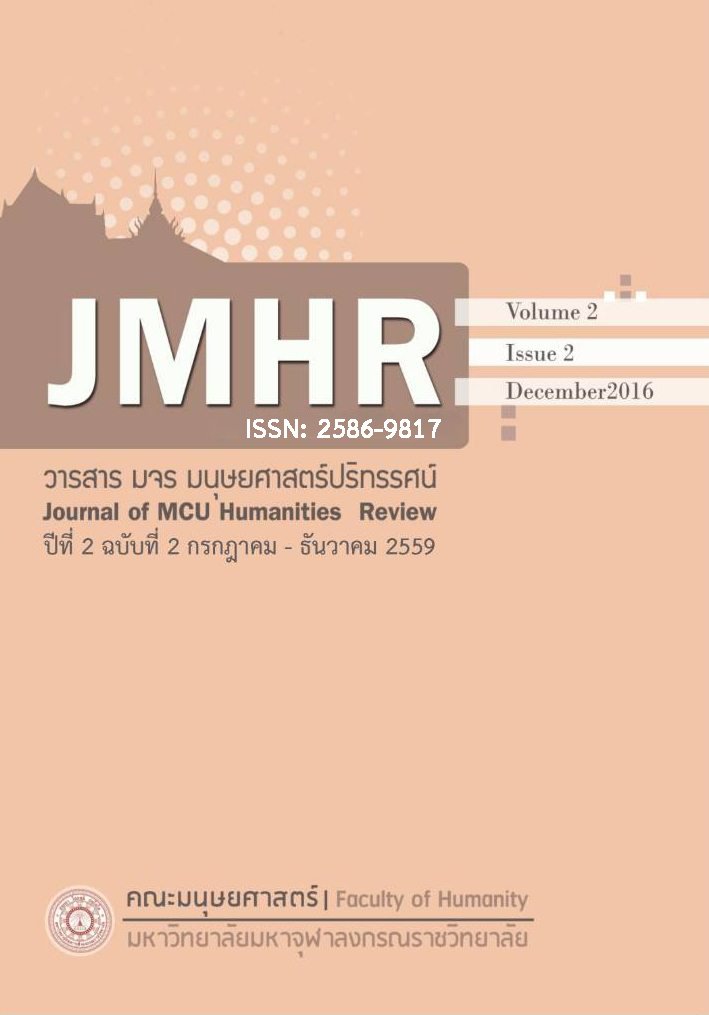แนวคิดการจัดการการท่องเที่ยว (วัด) ในพระพุทธศาสนา: หลักการ และวิถีปฏิบัติ
บทคัดย่อ
บทความนี้มีเป้าหมายเพื่อศึกษาแนวคิดในการจัดการท่องเที่ยวตามแนวพุทธเพื่อสะท้อนออกมาทั้งในส่วนหลักการ แนวคิด และวิธีการปฏิบัติต่อวัด/ศาสนสถานในพระพุทธศาสนา การศึกษาใช้การศึกษาจากเอกสารและงานวิจัยที่เกี่ยวข้อง รวมทั้งการสังเกตถึงพฤติกรรมและปรากฏการณ์ทางสังคม วิเคราะห์และสังเคราะห์ออกมาเป็นแนวคิดและวิธีการปฏิบัติที่เหมาะสม
ผลการศึกษาพบว่า การจัดการท่องเที่ยวมีส่วนสำคัญต่อการพัฒนาทรัพยากรการท่องเที่ยวที่มีอยู่ให้เกิดประโยชน์อย่างสูงสุด ทั้งการจัดการนั้นยังส่งผลให้เกิดการสร้างรายได้ให้กับสังคมและประเทศชาติ จากอุตสาหกรรมการท่องเที่ยวในองค์รวม การจัดการทรัพยากรท่องเที่ยว (วัด)
ในพระพุทธศาสนา และศาสนสถานที่เนื่องด้วยพระพุทธศาสนา มีแนวโน้มการใช้ทรัพยากร
เป็นปัจจัยหลักเพิ่มมากขึ้นในการเข้าไปจัดการท่องเที่ยว เหตุนั้นในการจัดการจึงต้องคำนึงถึงความเป็นพระพุทธศาสนาในองค์รวม ทั้งในส่วนแนวคิด หลักการ และแนวปฏิบัติที่ถูกต้อง โดยการจัดการท่องเที่ยวนั้นต้องเข้าไปสนับสนุนให้เกิดการรักษาหลักการ ให้เกิดการเรียนรู้ ในศาสนา
วางตน ปฏิบัติตัวได้ถูกต้อง ทั้งเข้าใจวิถีแห่งศาสนา จนสามารถปฏิบัติตนตามหลักศาสนาต่อสถานที่อันเป็นที่ท่องเที่ยวนั้นได้ เพื่อก่อให้เกิดผลทั้งคุณภาพ (พอดี) ดุลภาพ (พอเพียง) และประสิทธิภาพ (พอควร) ต่อหลักการที่ถูกต้อง โดยมีเป้าหมายหลักเป็นประโยชน์เพื่อส่วนรวม และส่งเสริมให้เกิดคุณภาพชีวิตตามแนวพุทธศาสนา ด้วยวิธีการเหล่านี้จึงจะได้ชื่อว่าเป็น การจัดการท่องเที่ยวตามแนวพุทธอย่างแท้จริง






